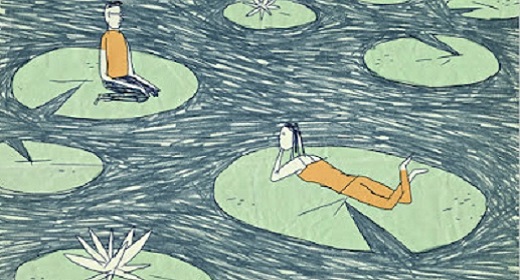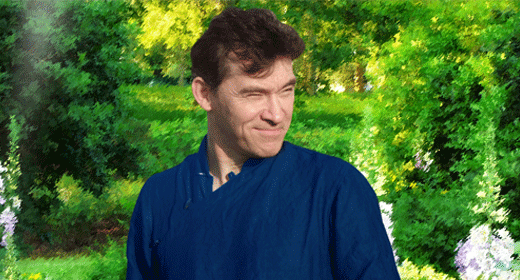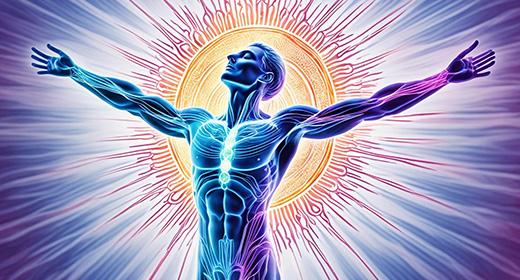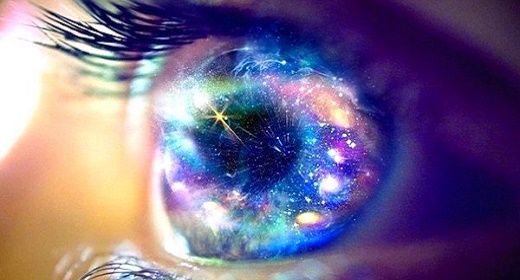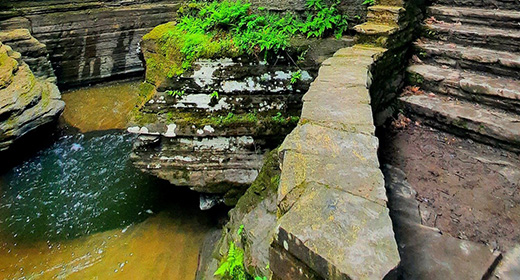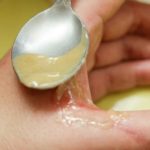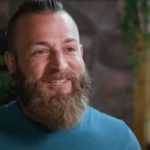Donna Quesada: Well, Dr. Ornish, it’s a pleasure to have you with us this morning and I just want to tell you how much we appreciate your time.
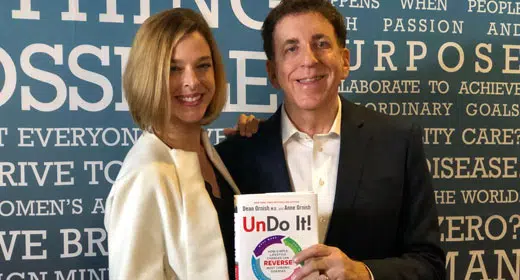
Dr. Dean Ornish: Thank you for this opportunity to share this information with the people who are watching this and I hope it will be useful to them.
DONNA: Thank you very much. And on a personal note, I have enjoyed your work for many years and I can’t wait to talk to you about certain things that you have been talking about for years, like vegetarian living and meditation and how to live a holistic lifestyle.
DEAN: Thank you!
DONNA: But, if you wouldn’t mind, we have a little tradition. We like to dive right into deep waters. And so, knowing you and knowing that you don’t just write about diet and health and stuff like that… Would you share with us… what is awakening to you?
DEAN: What does the word awakening mean?
DONNA: What does it mean to wake up or to awaken?
DEAN: In its deepest sense, awakening is to see the reality of how things really are. And to me, awakening is the first step in healing. I think it’s just another way of talking about awareness. And that’s one of the reasons I have been doing research for so many years. The power of these simple changes which most people aren’t aware of… On a spiritual level, awakening means you see the reality that on one level we are separate… you are you and I am me. And, on another level, we are part of something larger that connects us—whatever name you give to that. Even to give it a name is to limit what is a limitless experience. That’s really the goal of all spiritual practices once you get rid of the things that we divide and conquer and fight and kill each other over.
What Aldous Huxley called the perennial philosophy of love and compassion and forgiveness are really part of all traditions. That’s really why we are here to grow in wisdom in that way. For me, reversing heart disease and Diabetes and Prostate Cancer and perhaps even Alzheimer’s are really trojan horses for what ultimately sets us free. Because one day we are all going to die. The mortality rate is 100%, one per person, so the real question for me, is not how long we live, but how well we live. You know, I got suicidally depressed in college. That was my awakening and doorway into this whole arena. But the ancient swamis and rabbis and priests and monks and nuns didn’t develop meditation and all these other things, including diet and exercise, just to live longer and unclog their arteries… You can do all those things; those things are wonderful. But, telling someone who is lonely and depressed that they are going to live longer… they’ll say, “I’m just trying to get through the day.”
Clearly, information is important, but it’s not sufficient for most people to make lasting changes in lifestyle. It’s not like I say, “smoking is bad for you” to someone, and they say, “I didn’t know that… I’ll quit today.” Everybody knows it and we are drowning in information from Google. So, what’s really important to me, is what really motivates us to make sustainable changes. And to me, these techniques quiet down our mind and body. To experience a more inner sense of peace and well-being. And to realize that if you take it deep enough… First of all, I call the book Undo It because my favorite key on the keyboard is the undo button and I thought, wouldn’t it be nice if we had one in our lives? And now, to a larger extent,we realize we do.
I studied for 40 years with an ecumenical spiritual teacher named Swami Sachidananda. He likes puns. I’d say, “what are you a Hindu?”And he’d say, “No, I’m an undo!” And, what I learned from him is that our health and our peace and our well-being are not things we get from outside ourselves. That’s really our nature… to be healthy and peaceful. And not being mindful and aware of that, we often… and perhaps, what might be the ultimate irony is, we run after all these things, thinking… if only I could get more money, more power, more beauty, more accomplishments, then I’d be healthy, then I’d be happy, then I’d be peaceful and people would love me and I wouldn’t feel so lonely and isolated.
And unfortunately, once you set up that view of the world, however it turns out, you generally feel bad. Until you get it, you feel stressed. And, if someone else gets it, you feel really bad. But, even if we get it, it’s seductive. ‘Cause even if we get it, it seems like these things really make you happy, but they don’t last. It’s invariably followed by Now what? It’s never enough. I can’t even enjoy the mountain I’ve climbed. I’m already looking over at the next one. Or, so what, big deal. It doesn’t provide a lasting meaning. They’ll say, the let down came from accomplishing the thing I thought was going to make me happy.
I was with a guy in Los Angeles yesterday, who is a billionaire. He was sharing with me how he became a billionaire in his 30’s and how depressed he became after that… because before, at least he had the myth that if he could just be rich and successful, he’d be happy. Some of the loneliest people are the ones who are rich and famous and realize it didn’t bring them what they thought. Now what? So, what these techniques do, is they quiet down our mind to realize that we have that already. Our nature is to be peaceful and happy. Further and deeper, you experience this transcendent state. That… on one level, we are separate. You’re you and I am me. But on another level, we are part of something larger that connects us all. And having that double vision to be able to see the unity and the diversity, enables us to go out in the world and accomplish even more, without getting sick or stressed in the process.
DONNA: In preparing for this interview, I remember you said something… I believe it was in your Ted-Talk. We live in such a high-tech world… we have so much available to us… it’s echoing what you just said… and yet, the answers are so simple! If we would just change our lifestyle, we could be healthier and happier. If you were to sum it up in a sentence or two… If it’s so simple, why don’t we do it? What holds us back?
DEAN: Well, a number of things. First of all, our unique contribution has been to use these very high tech, expensive scientific measures to prove how powerful these very simple, low cost, low tech, and often very ancient interventions can be. We are trained to use drugs and surgery as doctors. We get reimbursed and paid to use drugs and surgery. So, not surprisingly, that’s what we do. I’m on the Committee of the American College of Cardiology and we wrote a paper together with the other members and we surveyed how much nutrition education does the average doctor get? It’s like four hours a year. And that’s like Vitamin C and Scurvy and stuff like that. But how much nutrition training does a cardiologist get in their four years of fellowship? The answer is zero.
That’s why I worked for 16 years… to work with CMS to get Medi-Care coverage for our program. Because before that, through our non-profit institute, we trained hospitals and clinics around the country and it worked. We got bigger changes in lifestyle, better clinical outcomes, bigger cost savings and the site closed down because we didn’t have the reimbursement. The painful lesson was, if it’s not reimbursable, it’s not sustainable. Now it is. Now that Medi-Care is paying for it, most of the other insurance companies are. We are training hospitals and clinics around the country. You can go to our website, ornish.com; it lists where they are.
So, we are really creating a new paradigm of health care. And the problem is, 3.6 trillion dollars was spent last year, on health care, which is mostly “sick care.” And 86% of that was for treating chronic diseases, which we found can often be prevented or even reversed at a fraction of the cost by just changing lifestyle. And, unlike most things we do as doctors, the side effects are mostly good ones. So, it’s a combination of the economics of it… the way that we are trained… and people just have a hard time believing… You mean, eat well, move more, stress less, love more. How powerful can that be? Well, pretty darn powerful! People think it has to be a new drug…a laser… something really high tech.
We showed, for example, in the first chapter of my new book… I give the example of a guy who is a doctor himself, who had such a massive heart attack that he was on a heart transplant list. And while waiting for a donor to give him a new heart, he went through our program at UCLA and he improved so much after nineweeks, that he didn’t even need a heart transplant anymore.
People say, “you’ve got this radical intervention… why don’t you do something more conventional?” What’s the more radical intervention? Eat well, move more, Stress less, love more or get a new heart? It costs a couple million dollars… you have to take immune-suppressants the rest of your life. We have lots of examples like that, just showing again, these same lifestyle changes can reverse so many chronic diseases.
So, in this new book, I present this new unifying theory. I was trained to see that heart disease was very different from high blood pressure, high cholesterol, prostate cancer or Alzheimer’s, or whatever. And the radical theory that we put forth is that they are really the same disease manifesting and masquerading in different forms. And that’s why with all this talk of personalized medicine… You don’t need one diet for this and one diet for that. And one kind of exercise for this and one for that. It’s the same problem. They all share the same underlying biological mechanisms. Things like chronic inflammation, stress, how much exercise we get, and how much love and support we get. People often have several of these conditions at the same time. They’ll have high blood pressure, high cholesterol, they will be overweight, they’ve got diabetes, they’ve got heart disease… all at the same time. And when people get put on drugs to lower their cholesterol or blood pressure or blood sugar and they say “doctor, how long do I have to take these?” The doctor says, “forever.”
For the last 40 years, I’ve been showing this cartoon I had drawn, showing doctors busily mopping up the floor of a sink that is overflowing, but nobody is turning off the faucet. How long do we have to mop up the floor? Forever! Why don’t we just turn off the faucet? And what we find is that under a doctor’s care, many people can get off of many or all of these medications that they were told they would have to take forever. And avoid a stint or a by-pass or a radical prostatectomy or a lifetime of medications.
I love doing this work because it’s profoundly empowering. And I think that things are changing. This is not a one sentence answer that you were asking for, but I think that’s the convergence of forces that after 40 years of doing this work, finally make this the right work at the right time. One the one hand, eight randomized trials have shown that angioplasties don’t really work in stabilized patients. They don’t prolong life, they don’t prevent heart attacks… they don’t even reduce stress pain. Yet, we spent 80 billion dollars on that last year, and by-pass surgery, that for most people, are dangerous, expensive, and largely ineffective. They are literally bypassing the problem. And you find that with prostate cancer and diabetes… by the way, half the population today, is diabetic or pre-diabetic. Getting your blood sugar down with diabetes doesn’t really stop the horrible side effects and complications of diabetes. Blindness and amputation and kidney failure and heart attacks and strokes and impotence…
The other way is getting it down with diet and lifestyle. So, I think the combinations of the limitations of the high-tech approaches… the power of the low-tech approaches… this field that we are helping create called “lifestyle medicine,” which uses lifestyle changes to treat or even reverse diseases, and the fact that people are understanding that it goes beyond our personal health to our social health and our planet’s health. What’s good for you is good for the planet and what is personally sustainable is globally sustainable.
More global warming is caused by livestock than all forms of transportation combined. It takes 10 to 14 times more resources to make a pound of meat-based protein than plant-based protein. It’s easy to say, “what can I do?” As one person, with all these life-threatening issues, like global warming or feeding the hungry… And it turns out that what you put in your mouth… Something as primal as that can feed the hungry and free up resources. Even just having a Meatless Monday can reduce global warming. One of the things we have learned is that if it’s meaningful, it’s sustainable. It’s meaningful not only because of how quickly you can get better, but these same things that are good for you, are good for the planet and so many other people.
Read and Watch Part II Here: Awaken Interviews Dr. Dean Ornish Pt 2 – What Is Good For Me Is Good For The Planet
Read and Watch Part III Here: Awaken Interviews Dr. Dean Ornish Pt 3 – From Fear Of Dying, to Joy Of Living
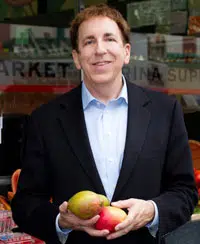 Dr. Dean Ornish, M.D., is the founder and president of the nonprofit Preventive Medicine Research Institute, clinical professor of medicine at the University of California, San Francisco, and the author of six books, all national bestsellers. He has received numerous honors, including the Outstanding Young Alumnus Award from the University of Texas, Austin, and the National Public Health Hero Award from the University of California, Berkeley. Dr. Ornish was recognized as a “TIME 100 Innovator;” by Life magazine as “one of the 50 most influential members of his generation;” by People magazine as “one of the most interesting people of the year;” and by Forbes magazine as “one of the world’s seven most powerful teachers.”
Dr. Dean Ornish, M.D., is the founder and president of the nonprofit Preventive Medicine Research Institute, clinical professor of medicine at the University of California, San Francisco, and the author of six books, all national bestsellers. He has received numerous honors, including the Outstanding Young Alumnus Award from the University of Texas, Austin, and the National Public Health Hero Award from the University of California, Berkeley. Dr. Ornish was recognized as a “TIME 100 Innovator;” by Life magazine as “one of the 50 most influential members of his generation;” by People magazine as “one of the most interesting people of the year;” and by Forbes magazine as “one of the world’s seven most powerful teachers.”

